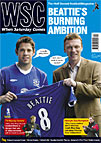 Dynamo Kiev were blue, rivals Shakhtar Donetsk orange – simple enough, until recent political upheavals gave colours new meaning, as Dan Brennan explains
Dynamo Kiev were blue, rivals Shakhtar Donetsk orange – simple enough, until recent political upheavals gave colours new meaning, as Dan Brennan explains
Sporting one’s colours is politically loaded business in Ukraine these days. Orange – the traditional colour of Shakhtar Donetsk – is also the colour of Viktor Yushchenko, the pro-Western presidential candidate, who defied a dodgy first ballot and an alleged attempt to poison him to gain power in December at the second time of asking. Meanwhile, his opponent, current prime minister Viktor Yanukovich – the man endorsed by Moscow and outgoing president Leonid Kuchma – opted for blue, the colour of Dynamo Kiev.
Confusingly, Donetsk is the heartland of the Blues, while Kiev has been the centre of Yushchenko’s “Orange Revolution”. And, as Shakhtar’s players recently discovered, the blurring of football and political hues is a minefield. When they emerged from the plane in Milan ahead of their Champions League game in their new Armani-designed mufti of black coats and orange scarves, the Shakhtar squad were accused by the pro-Yanukovich media of supporting Yuschenko. Conversely, when they appeared on the San Siro pitch sporting white instead of orange, pro-Yushchenko journalists sensed a tacit snub to their man.
When media reports then suggested that the club were planning to ditch their traditional orange-and-black strip in favour of blue – in support of Yanukovich – there was outrage among fans and the club issued an angry denial. “FC Shakhtar plays for everyone despite the fan’s political view,” read the statement. “The team wants to be cheered by both Yushchenko and Yanukovich’s supporters.” But, in a country where boundaries between big business and politics are decidedly blurred, few are naive enough to buy the notion that football is apolitical, when the men who control Shakhtar and Dynamo happen to be two of its most influential oligarchs. Since the collapse of the Soviet Union more than a decade ago, Ukraine has turned into a battleground for industrial “clans” that vie for political and economic influence, and which have helped to earn the country its international reputation as a corruption-infested basket case.
Two of the most powerful groupings are the Kiev and Donetsk clans. The latter spawned Yanukovich – a former car mechanic with a couple of convictions for burglary and assault to his name, who later went on to become the region’s governor. But the real power in Donetsk is Shakhtar’s owner and president, Rinat Akhmetov, who is just 38 and was recently confirmed as Ukraine’s richest man with an estimated wealth of $3.6 billion (£1.9bn), accrued from an empire spanning coal, steel and media interests. It is widely believed that Akhmetov used his political influence with President Kuchma to persuade him to endorse Yanukovich as his successor.
At the centre of the Kiev clan is Grigory Surkis, who with business partner Viktor Medvedchuk has close links to the outgoing president, Kuchma. Surkis is also head of the Ukrainian football federation and, until he handed over the reins to his brother, Ihor, was president of Dynamo Kiev, where he remains influential.
The rivalry between the two clans and their leaders has provided an intriguing subtext for the football duopoly of Dynamo and Shakhtar over recent years: the former the aristos from the capital; the latter the nouveau riche provincial upstarts. Spicing up the rivalry further is the fact that the two clubs also embody the regional tensions that have been so evident during the recent elections. Dynamo hail from the pro-European, Ukrainian-speaking west of the country, while Shakhtar represent the Russian-speaking east, which views Moscow as its natural ally. However, the elections prompted Surkis and Akhmetov to put aside their differences and find common cause in their support for Yanukovich. For Surkis, increased influence for the Donetsk clan was the lesser evil compared with the anti-clan platform of Yushchenko.
Andriy Shevchenko, meanwhile, appeared on a TV channel owned by Surkis to issue what seemed to be a ghostwritten endorsement of the Blue ballot. By contrast, his less fêted friend and former strike partner Sergei Rebrov has been sporting an orange wristband in a show of support for Yushchenko and has been a regular at political meetings at the embassy in London. Given that Rebrov hails from the Yanukovich heartland in the Donbass, his allegiance will not make him popular in his own backyard.
Shakhtar have assured fans that “the orange colour is obligatory despite the revolutionary movements in our country”. Doubtless, though, the results of December’s rerun election will have left their owner, and his counterpart at Dynamo, feeling just a little blue.
From WSC 216 February 2005. What was happening this month